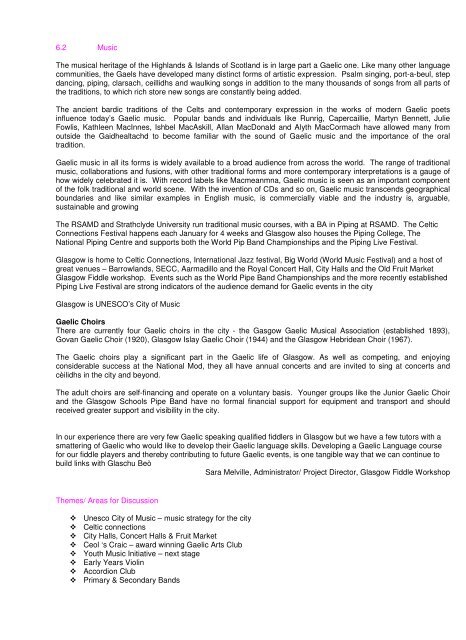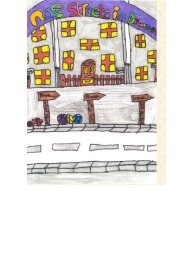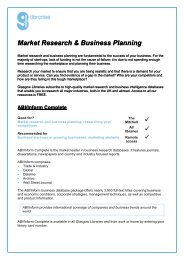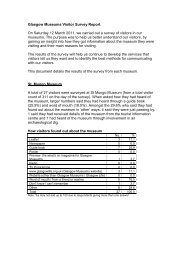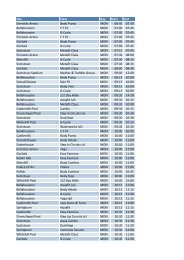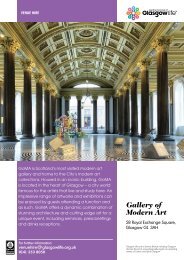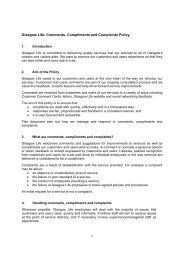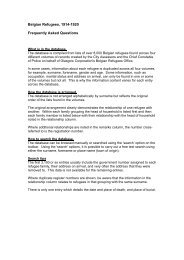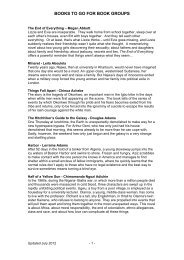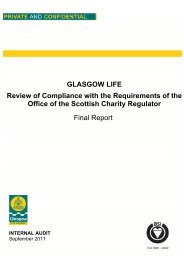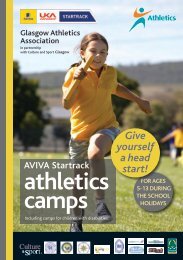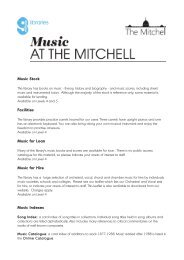Gaelic Arts Plan (Draft Consultation Document) 12th ... - Glasgow Life
Gaelic Arts Plan (Draft Consultation Document) 12th ... - Glasgow Life
Gaelic Arts Plan (Draft Consultation Document) 12th ... - Glasgow Life
You also want an ePaper? Increase the reach of your titles
YUMPU automatically turns print PDFs into web optimized ePapers that Google loves.
6.2 Music<br />
The musical heritage of the Highlands & Islands of Scotland is in large part a <strong>Gaelic</strong> one. Like many other language<br />
communities, the Gaels have developed many distinct forms of artistic expression. Psalm singing, port-a-beul, step<br />
dancing, piping, clarsach, ceillidhs and waulking songs in addition to the many thousands of songs from all parts of<br />
the traditions, to which rich store new songs are constantly being added.<br />
The ancient bardic traditions of the Celts and contemporary expression in the works of modern <strong>Gaelic</strong> poets<br />
influence today’s <strong>Gaelic</strong> music. Popular bands and individuals like Runrig, Capercaillie, Martyn Bennett, Julie<br />
Fowlis, Kathleen MacInnes, Ishbel MacAskill, Allan MacDonald and Alyth MacCormach have allowed many from<br />
outside the Gaidhealtachd to become familiar with the sound of <strong>Gaelic</strong> music and the importance of the oral<br />
tradition.<br />
<strong>Gaelic</strong> music in all its forms is widely available to a broad audience from across the world. The range of traditional<br />
music, collaborations and fusions, with other traditional forms and more contemporary interpretations is a gauge of<br />
how widely celebrated it is. With record labels like Macmeanmna, <strong>Gaelic</strong> music is seen as an important component<br />
of the folk traditional and world scene. With the invention of CDs and so on, <strong>Gaelic</strong> music transcends geographical<br />
boundaries and like similar examples in English music, is commercially viable and the industry is, arguable,<br />
sustainable and growing<br />
The RSAMD and Strathclyde University run traditional music courses, with a BA in Piping at RSAMD. The Celtic<br />
Connections Festival happens each January for 4 weeks and <strong>Glasgow</strong> also houses the Piping College, The<br />
National Piping Centre and supports both the World Pip Band Championships and the Piping Live Festival.<br />
<strong>Glasgow</strong> is home to Celtic Connections, International Jazz festival, Big World (World Music Festival) and a host of<br />
great venues – Barrowlands, SECC, Aarmadillo and the Royal Concert Hall, City Halls and the Old Fruit Market<br />
<strong>Glasgow</strong> Fiddle workshop. Events such as the World Pipe Band Championships and the more recently established<br />
Piping Live Festival are strong indicators of the audience demand for <strong>Gaelic</strong> events in the city<br />
<strong>Glasgow</strong> is UNESCO’s City of Music<br />
<strong>Gaelic</strong> Choirs<br />
There are currently four <strong>Gaelic</strong> choirs in the city - the Gasgow <strong>Gaelic</strong> Musical Association (established 1893),<br />
Govan <strong>Gaelic</strong> Choir (1920), <strong>Glasgow</strong> Islay <strong>Gaelic</strong> Choir (1944) and the <strong>Glasgow</strong> Hebridean Choir (1967).<br />
The <strong>Gaelic</strong> choirs play a significant part in the <strong>Gaelic</strong> life of <strong>Glasgow</strong>. As well as competing, and enjoying<br />
considerable success at the National Mod, they all have annual concerts and are invited to sing at concerts and<br />
cèilidhs in the city and beyond.<br />
The adult choirs are self-financing and operate on a voluntary basis. Younger groups like the Junior <strong>Gaelic</strong> Choir<br />
and the <strong>Glasgow</strong> Schools Pipe Band have no formal financial support for equipment and transport and should<br />
received greater support and visibility in the city.<br />
In our experience there are very few <strong>Gaelic</strong> speaking qualified fiddlers in <strong>Glasgow</strong> but we have a few tutors with a<br />
smattering of <strong>Gaelic</strong> who would like to develop their <strong>Gaelic</strong> language skills. Developing a <strong>Gaelic</strong> Language course<br />
for our fiddle players and thereby contributing to future <strong>Gaelic</strong> events, is one tangible way that we can continue to<br />
build links with Glaschu Beò<br />
Sara Melville, Administrator/ Project Director, <strong>Glasgow</strong> Fiddle Workshop<br />
Themes/ Areas for Discussion<br />
Unesco City of Music – music strategy for the city<br />
Celtic connections<br />
City Halls, Concert Halls & Fruit Market<br />
Ceol ‘s Craic – award winning <strong>Gaelic</strong> <strong>Arts</strong> Club<br />
Youth Music Initiative – next stage<br />
Early Years Violin<br />
Accordion Club<br />
Primary & Secondary Bands


